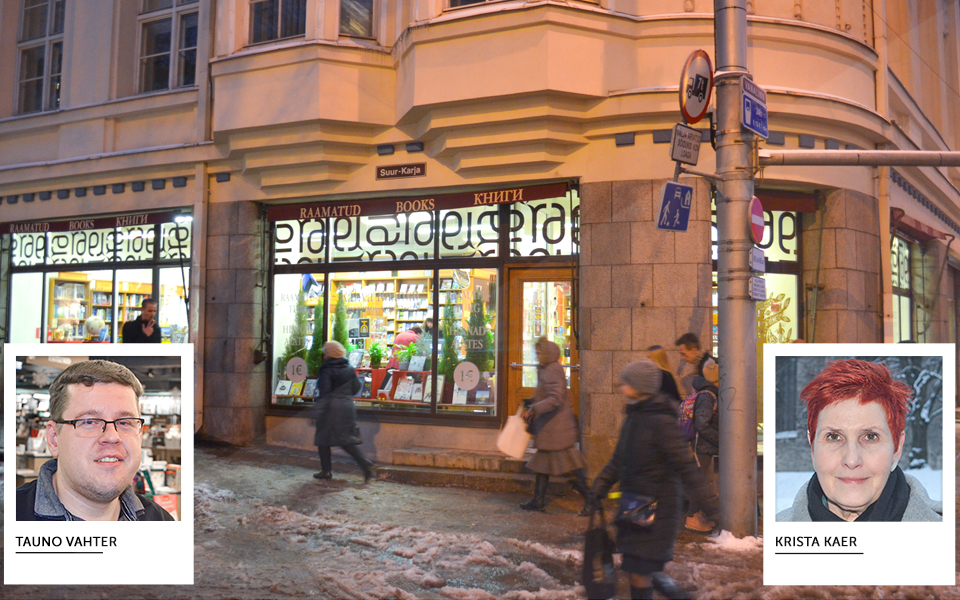Roger Tagholm
Booksellers becoming publishers, high prices and falling print runs are among issues concerning the book industry in the Baltic states, industry journalists from the UK and US learned on a fact-finding mission to the region ahead of the Baltic states becoming Market Focus at the London Book Fair in April.
In Estonia, the most northerly of the three states (the others are Latvia and Lithuania), both the main retail chains, Apollo and Rahva Ramaat – its name means ‘the people’s book’ and dates from Estonia’s time under Soviet rule – have started their own publishing lists. Apollo began its own publishing programme four years ago, with just two titles a year at Christmas, increasing to four last year. But Ramaat has adopted the strategy in a much bigger way. Last autumn it started with around ten titles, but this year it has plans for 40 to 50 titles.
Publishers are concerned because, in a small market like Estonia, whose population is roughly similar to Sharjah, visibility for titles in bookshops is key. Tauno Vahter of Tanapaeu publishers, says: “Publishers are not terribly happy. It depends on how the retailers do it. There is a limited amount of space in bookshops, so obviously, the temptation is to display their own titles. If it’s four or five titles, it’s not a problem – but what happens when it’s 50 to 100 titles?
“But it is competition and we have to deal with it. There is no law that says bookshops cannot be publishers. We just hope there is equal treatment.”
Publishers across the region are also concerned about falling print runs which means higher prices which means lower sales which means falling print runs – it’s a vicious circle that concerns everyone. Krista Kaer of Estonia’s biggest publisher, Varrak, says: “The market is not very good at present. It’s down between ten and 20%. I think part of the reason is that people borrow books from libraries because they don’t want any more books in their homes. Many people have inherited lots of books from their parents who bought books in Soviet times when they were cheap.
“I think people read less now, and the people who do read are teachers whose salaries are low and so cannot afford books. I’m bothered by Raamat publishing books too, because they have a better opportunity to promote their titles.”
But on a positive note she praised the Cultural Endowment fund, financed by the government, which provides funds for the translation of literary fiction and also helps local Estonian writers.
Digital books have yet to make serious inroads in the region, partly because there isn’t a popular retail platform for them as yet. Amazon has not really arrived in any big way – though some people do buy English titles from it – and in Latvia there are concerns about piracy, which has made publishers reluctant to digitise their lists. In Latvia, only around 1500 ebooks are available.
Throughout the region the status of poetry and poets is notable, something that the Baltic states shares with much of the Arab world. There is a rich culture of poetry publishing, stemming from a strong oral culture. During the region’s difficult time under Soviet rule – before independence in 1991 –poets were “the conscience of society,” according to Anda Baklane of the National Library in neighbouring Latvia. “Poetry festivals were very popular during this time and the poets were almost superstars”.
All-told, a dozen writers are coming to London for the book fair and to participate in a wider cultural programme across the UK. Jacks Thomas, Director of the London Book Fair, says: It is a privilege to welcome such a talented group of authors to LBF 2018 from the Market Focus Baltic Countries. We greatly appreciate British Council and all our partners in Estonia, Latvia and Lithuania for bringing together such a diverse and interesting group of authors, representing children’s literature and poetry to history and compelling novels. We know the programme will be inspiring and generate interest in literature and writing from the Baltics for years to come.”







